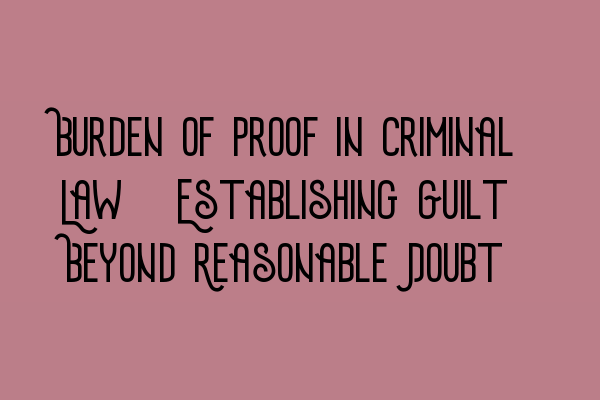Burden of Proof in Criminal Law: Establishing Guilt Beyond Reasonable Doubt
In the criminal justice system, the burden of proof lies on the prosecution to establish the guilt of the accused beyond reasonable doubt. This is a fundamental principle that underpins the fairness and integrity of criminal trials.
Beyond reasonable doubt is a high standard of proof that requires the prosecution to present evidence that is so convincing that there is no reasonable doubt in the minds of the jurors. It is not a standard that demands absolute certainty, but it does require a level of certainty that would leave no room for any reasonable alternative interpretation of the evidence.
The Importance of the Burden of Proof
The burden of proof is crucial in criminal law because it serves as a safeguard against wrongful convictions and protects the accused’s right to a fair trial. It places the onus on the prosecution to present persuasive evidence that supports the guilt of the defendant.
The burden of proof is heavily influenced by the principle of presumption of innocence, which states that every person is considered innocent until proven guilty. This principle ensures that the accused are not unfairly prejudiced or stigmatized before their guilt is established beyond reasonable doubt.
By placing the burden on the prosecution, the legal system aims to prevent the conviction of innocent individuals. A wrongful conviction can have devastating consequences for the accused, including loss of liberty, damage to reputation, and irreversible emotional trauma.
Evidence and the Burden of Proof
To establish guilt beyond reasonable doubt, the prosecution must present evidence that is both admissible and credible. Admissible evidence is evidence that is legally allowed to be presented at trial, while credible evidence is evidence that is reliable and trustworthy.
Admissible evidence can include witness testimonies, physical evidence, documentary evidence, and expert opinions. The prosecution must ensure that the evidence it presents is relevant, reliable, and obtained legally. Any evidence that is obtained unlawfully or is deemed irrelevant will not be admissible.
Furthermore, to meet the burden of proof, the evidence presented must be credible. This means that it must be believable and capable of convincing the jurors of the accused’s guilt. Credibility can be affected by factors such as witness reliability, consistency of statements, corroboration from other sources, and the absence of any plausible alternative explanations.
Reasonable Doubt and the Burden of Proof
The concept of reasonable doubt is central to the burden of proof in criminal law. It requires the jurors to be convinced of the accused’s guilt to such a degree that they have no reasonable doubt in their minds. This means that any doubt must be based on reason and not mere speculation or conjecture.
The prosecution does not need to eliminate all possible doubt but must provide evidence that leaves no reasonable doubt. Jurors are expected to use their reason and common sense to evaluate the evidence presented and consider any possible alternative explanations or defenses raised by the accused.
When the burden of proof is not met and reasonable doubt exists, the accused must be acquitted. The presumption of innocence prevails, and the accused’s freedom and rights are protected.
Conclusion
The burden of proof in criminal law, which requires the prosecution to establish guilt beyond reasonable doubt, is a fundamental principle that safeguards the rights of the accused. It ensures that convictions are based on solid evidence and not on conjecture or speculation.
By understanding the importance of the burden of proof and its relationship with reasonable doubt, we can appreciate the complexities of criminal trials and the need for a thorough examination of evidence. SQE Criminal Law & Practice Law UK provides comprehensive courses and preparation materials to help aspiring solicitors gain a deep understanding of criminal law and its application in practice. To enhance your knowledge, consider exploring our SQE 1 Practice Exam Questions and SQE 1 Practice Mocks FLK1 FLK2 to test your understanding. Additionally, if you are looking to further enhance your legal skills, check out our SQE 2 Preparation Courses and SQE 1 Preparation Courses which are designed to equip you with the necessary knowledge and skills to excel in your legal career.
Stay informed about the latest updates and SRA SQE exam dates by visiting our website: SRA SQE Exam Dates.
